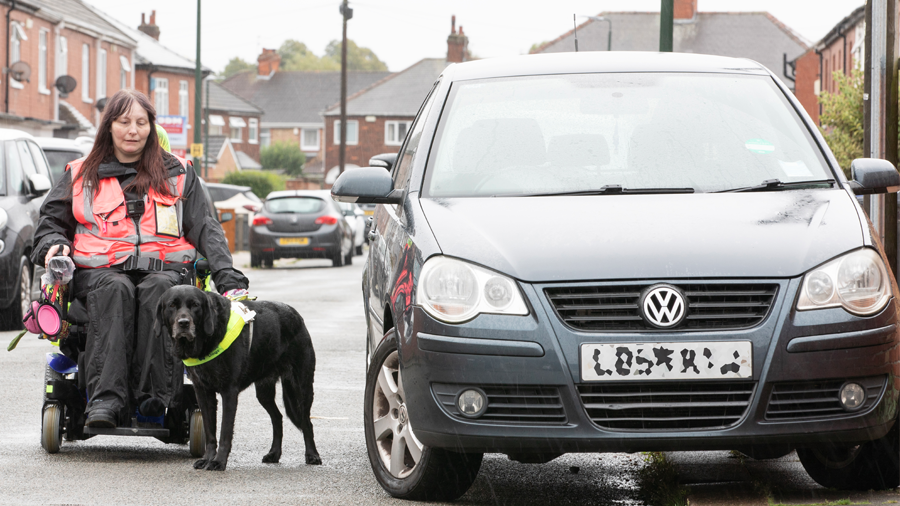Guide Dogs is urging the Government to address the issue of dangerous pavement parking, which poses significant challenges for individuals with visual impairments.
For those with sight loss, navigating around vehicles that block footpaths can be particularly hazardous. They often cannot judge whether they can safely pass by a parked car, and in many instances, are compelled to venture onto the road, placing them at risk from moving traffic.
Julie Pilsworth of Grimsby and her guide dog, Maeve, confront this issue regularly. Navigating around parked cars becomes even more challenging for Julie due to her mobility chair.
According to a recent YouGov study commissioned by Guide Dogs, 85% of respondents were aware of the dangers pavement parking presents to visually impaired pedestrians. Of those surveyed, 72% noted that pavement parking was a frequent occurrence in their localities.
Further polling by YouGov, involving local councillors in England, revealed that 95% viewed pavement parking as a safety concern for pedestrians with sight loss. Moreover, 70% of councillors acknowledged pavement parking as a prevalent problem within their jurisdictions.
Despite the Government seeking public opinion on potential measures to combat pavement parking in 2020 – garnering over 15,000 responses, including feedback from Guide Dogs – there has been little advancement on this front.
In response to this inertia, Guide Dogs is advocating for the introduction of nationwide restrictions on pavement parking. They emphasise the need for clear legislation where such parking is an exception rather than a norm, ensuring that all pedestrians can safely use pavements.
The public appears to be in agreement with Guide Dogs’ proposition. 57% of those polled expressed support for confining pavement parking to areas deemed absolutely necessary by local councils. From the council side, 74% of councillors backed Guide Dogs’ proposition.
However, only 22% of councillors felt that their existing authority was adequate in addressing this issue. Interestingly, 40% of them indicated that residents raise concerns about pavement parking to them on a monthly basis.
Eleanor Briggs, who is the Head of Policy, Public Affairs and Campaigns at Guide Dogs, stated, “The feedback from both the public and local councillors is unequivocal: our streets are rendered unsafe by vehicles obstructing pavements. The onus is on the Government to intervene, given that local councils are not adequately empowered. While pavement parking is bothersome for all, it can be perilous for those in wheelchairs, parents with pushchairs, and individuals with sight loss who might not detect oncoming traffic.”
Briggs added, “It’s evident that such obstructions severely impact the confidence of visually impaired individuals, limiting their ability to independently go about their daily activities. Although the Government has acknowledged the issue, the time has come to translate recognition into tangible action, empowering local councils to address pavement parking concerns in their respective areas.”
Given these concerning findings, Guide Dogs emphasises the urgent need for the law concerning pavement parking to be reinforced.
To support the campaign to legislate against pavement parking, or to find out more, sign the petition on the Government’s website.
Imgae: Courtesy of Guide Dogs. Guide dog owner Julie Pilsworth and guide dog Maeve, Julie is a power chair user and guide dog owner from Grimsby.








